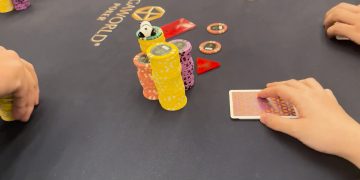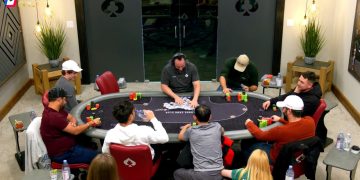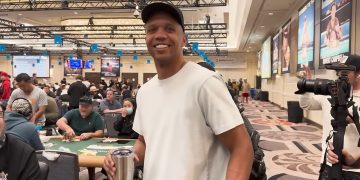Many people hate pocket jacks, but that’s only because they don’t know how to play them. The problem begins with perception.
Pocket Jacks Perception
Let’s call it what it is. Jacks are the lowest-value picture cards. Since they’re picture cards (paint), it leads to people believing that pocket jacks should be a dominant pair. That’s despite the fact that AA have no pictures.
It’s also despite the fact that you want to be heads-up if you’re getting it all-in with KK. And let’s not forget that QQ doesn’t do as well in multiway pots as people think when the hand goes to showdown. If you consider all those factors, what do you have left?
What you have is a hand that people overvalue in both traditional poker games and poker tournaments, then complain that they lost (because they overvalued it). Some people say you should play JJ like 99. Umm … no. You should play it like JJ. Then you have the pros who believe you should be uber-aggressive with it because an opportunity like that doesn’t come along that often.
Perhaps they’re correct, but I’m not going to build an enormous pot on chance when I can see a cheaper flop later with a hand like K9s and earn just as many chips, if not more, and with less risk. Maximizing potential gain without taking on too much risk definitely fits within our poker rules for winning.
![]()
![]()
![]()
![]()
Oh, K9 isn’t one of your favorite poker hands, hey? I understand, but look at it this way. Do you think the average poker player is going to feel more committed to a pot when holding JJ or K9s? If you answered JJ, you’re correct. And if you think some players are crazy to commit that much to one pot with JJ, you’re also correct. It’s just another hand! One of many poker hands. If you want some poker strategy, don’t overvalue any hand. It’s always just another hand.
In fact, you’re likely to play well over 100 poker hands when you go deep in poker tournaments. Do you really want to risk a lot of your stack, or all of your stack, on one hand? I get it if it’s AA or KK, but JJ? Really? You’re just going to lay it all out there? You might be ahead mathematically in most spots, I get that, but you’re also taking your skills out of the equation. Wouldn’t you rather outplay your opponents over a larger sampling of poker hands?
Relating Sports to JJ
Look at it this way. Let’s say you’re a MLB baseball player. Your batting average is .345. For those of you who don’t know much about baseball, that’s very high. Let’s say you’re up against a good (not great) pitcher. Would you rather face this pitcher one time as a pinch-hitter OR would you rather face this pitcher several times?

You’re a more talented player. Therefore, which scenario would lead to the best results? You could go for it on one at-bat since you’re the more talented player, but as we both know, anything can happen in a sampling of one. You are much better off with several at-bats.
Or, let’s look at it this way. Let’s say you’re much more talented than someone who wants to play 1-on-1 basketball. If you play to a score of 1 (first basket wins), you have the edge, but that player could hit a crazy hook shot even though you’re right up on him (or her) and win the game.
Does that really indicate who is the better player? Or would you rather play to 21 (winners out, everything back except steals and airballs, ones and twos, win by two/straight 25)? I’m going with the latter.
Maybe you play golf. Let’s say you invited some guy from the office to play, even though he said he doesn’t play. You’re way more talented and you have chosen to make a fun bet that the loser buys the other one dinner. Do you want to base this on one Par 3, or do you want to base it on 18 holes?
I’m not a tennis player, but I’m an athlete that plays tennis. Somehow, I’m able to beat a lot of tennis players. This is only because I run around and hit everything back. I don’t hit the ball hard on my groundstrokes at all. I just keep the ball in play and wait for them to make a mistake. They get frustrated because I won’t go away.
However, I hit the ball very hard when at the net. You need to mix it up sometimes. Also a good idea to throw some spin in there on the serves to keep them guessing.
I went a little off-track here, but I’m trying to show you that a personality doesn’t change based on the game or sport you’re playing. I play tennis exactly the way I play poker. Same likely goes for you, whether you realize it or not.
A JJ Story
Of course, I’m really trying to tell you not to put so much value into one hand, especially JJ. Last summer, I played in a small poker tournament at Harrah’s Cherokee. I was on the bubble, I was short-stacked (another player not far behind) and I was dealt JJ UTG. I thought about it for a brief moment, then folded.
When I wrote about my poker strategy for that hand on Facebook, it was a nightmare. I had half the people agreeing with me and half the people disagreeing with me. I don’t like drama in my life, and I don’t want my page to be about that, so I made an error by posting it. However, at least I can tell you about it now.
More pros said I should have open-jammed it. More of the recreational players agreed with the fold. I then went behind the scenes and asked a few friends to ask the higher-level pros. They agreed with the fold. This isn’t the first time something like this has happened.
A lot of professional poker players want to play the book. They don’t want to veer off course, and it works for them. I get it! If it ain’t broken, don’t fix it. And the really high level players are using Next Level thinking, which is more based on experience and patterns. To be clear, I AM NOT putting myself in that category. No way! I’m just happy they agree with me on some things related to Texas Hold’em Poker strategy.
My poker tips are more geared for the low-limit player, but they can really be applied by anyone, even if they’re just supplementing ideas related to poker strategy for tournaments.
As far as that bubble hand goes, I would have been up against QQ and 76s. I would have won due to a flush on the river. Do you think I made the correct decision or the wrong decision?
There is more than one way to answer that question. I’ll give my own answer. The novice would say I made the wrong decision because I would hit a flush on the river. The more experienced player would say I made the correct decision because I made the right fold and it’s correct to be decision-oriented opposed to results-oriented.
Others will say you can’t call it decision-oriented because I was first to act. I say that in itself is an excellent reason to fold in that spot: I was first to act. There is too much that can go wrong when I’m UTG and there is another bubble contender.
All I had to do was sit back and wait for the other short-stack to bust. I did have to pay the blinds, but with 10 BBs, I had plenty of breathing room. Additionally, the other short-stack was a macho guy, which based into my decision. His Ego would get the best of him and he would shove light.
I was correct in that assumption. I made it through the blinds and the other short-stack jammed light, but he got lucky against a superior hand, which doubled him up. Now I was the only short-stack, which led to me jamming with ATo and losing a few hands later. I was the bubble. This wasn’t fun.
Now that you know the end of the story, you might say I made a mistake, but I don’t play just my cards, I play situations. In most cases, this will help me, but nobody wins every time.
The factors that led to my fold: first to act, 10 BBs meant plenty of breathing room on the bubble (for me), I had already invested four hours into the tournament and didn’t want to leave empty-handed, I knew the other short-stack would shove light (he did).
The Other Side of JJ

If I like my analysis for a decision, I’m not going to regret it. As some of you know, I also had to make the toughest call of my life with JJ, which led to just shy of $21k. It likely would have been a lot more if a diamond didn’t come on the river later in that tournament, but it wasn’t meant to be.
In that tournament, I was dealt JJ six times on Day 2. I played them correctly every single time, which is the best I have ever played. I knew when to fold, raise, and call in each situation with JJ.
Those decisions were based on many variables, not just the cards. I needed to factor in the importance of the tournament to my opponents, stack sizes, position, betting patterns, player patterns, pay jumps, how others would view pay jumps, how others viewed me, and the reactions of the people on the rail for other players (you can pick up reads this way).
What I’m trying to say is that if you stick to your gut, you might not win them all, but you’re going to win most of the time. Even if you don’t win, you will still be okay with it. It’s those times when you go against your gut and who you are that will hurt. I still make those mistakes, but I have minimized them in Texas Hold’em Poker as well as other poker games.
Playing JJ Mid-Tourney
I’m writing about playing JJ mid-tourney because the pots are small early in a tourney, and you might be forced to jam with JJ late in a tourney. Don’t get the wrong idea from the above information. I only folded JJ short-stacked because I was on the bubble and I knew the other short-stack would shove light. It didn’t work out, but it made sense to me.
As far as playing JJ mid-tourney, how to play pocket jacks depends on several factors. The first thing you should keep in mind is that most players will raise the hell out of this hand pre-flop because they’re afraid to play it. Therefore, when you see these massive raises pre-flop, it’s often JJ. They sometimes show it after everyone folds and say, “Only way to play them.”
Umm … that’s not how you play them. You just extracted almost zero value. You can limp with them in order to disguise them. If you flop a set, nobody will see it coming whatsoever and you will likely scoop a nice pot. The other way to play them is with a standard raise. This is often effective.
Since it’s a standard raise, very few people will put you on JJ. They’re used to seeing massive raises when someone has JJ. Whether they realize it or not, seeing this so many times has led to a subconscious expectation in their minds. Simply by putting in a standard raise, they are less likely to put you on JJ. I’m not saying you are going to win the hand, but it’s unlikely that you will be detected.
We can’t forget position. The more limpers there are, the more you want to bump it up. This will often lead to value without any resistance (they will all fold pre-flop). The tricky spots are when you’re in late position with JJ and someone raised prior to you acting.
A couple of factors here related to poker tips on playing JJ. One, who is the opponent? If it’s a maniac, you should lean toward a raise. If it’s a TAG player, you should lean toward call. But the size of the bet is even more valuable. I recommend combining the two.
Let’s say the blinds are 2,000/4,000/4,000. This means the SB is 2,000 and the BB is 4,000/4,000 (the second 4,000 is for the BB ante). You have 140k in chips. A TAG player UTG +1, also with 140k in chips, raises to 18k. This is a big raise for a player like him, especially given his position. You are likely behind with a very outside chance it’s a race. This is either a fold or a call. Personally, I would call.
I would call because I know I’m behind against a TAG player. Don’t forget the ‘AG’ aspect of TAG. If I have him on a bigger pair and I whiff the flop, I’m gone. I know it cost me 18k, but you don’t win these tournaments by giving up spots like this. You win these tournaments by playing spots like this and running good.
If I hit that set and I have him on an overpair, then I know he’s very unlikely to fold. I also WANT two of the same suit on the flop. Why? Because it will look like I have a flush draw when I bet an insane amount, which makes it more likely that he will call. I literally have the potential to stack this player here (I have done it many times).
I can tell you without a doubt that my biggest run-ups have been hitting sets against big pairs. I will find a way to get them to commit all of their chips. That route depends on my opponent and their tendencies. If it’s a regular poker pro, I’m jamming right on the flop. They will almost always call because they will say to themselves: This dude plays all over the place. There is no way he’s jamming with a set here. It’s too big of an overbet.
If it’s a maniac, I’m going to get into an Ego battle with him street-by-street, knowing he won’t be able to resist putting all his chips into the middle on the river.
If it’s a NIT, I have a problem. My only real chance to get maximum value is to let him lead and hope he doesn’t catch on. This will often require some serious acting skills (meaning it won’t look like I’m acting). The problem with NITs is that they’re hesitant to call your raises unless they have the nuts.
Final Thoughts
Please understand that I’m not telling you how to play pocket jacks. Play them as you wish. I’m just telling you how I view JJ and how that relates to poker strategy for tournaments. This is all based on my experiences and what I have seen work and not work. I will say this for sure: Not overvaluing pocket jacks fits into our poker rules for winning.
On the other end of the spectrum, if you raise the hell out of them pre-flop, you’re not going to win anything. What’s the point of that? JJ is just another poker hand. I recommend treating it as such. See you at the WSOP!
♠ pokerjournal.org


















Discussion about this post